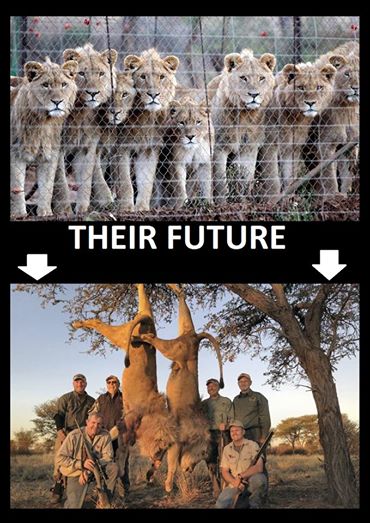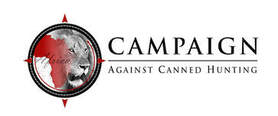Breeding factory for trophy hunters

Lions and tigers from Port Elizabeth's Seaview Predator Park are being sold to game farms known for hunting and the exporting of animal bones
9 Sep, 2014
Gareth Wilson
Last week, Somyo responded to questions by the DA's chief whip in Bhisho, Bobby Stevenson, regarding the transportation of lions and tigers in and around South Africa.
Seaview has always denied supplying lions for hunting:
Quote
"I can assure you none of these lions from Seaview are used for hunting"
And one of the farms has been linked to Laos-based Xaysavang Network, which has been described "as one of the
most prolific international wildlife trafficking syndicates in operation".
Although the park has refused to comment, Eastern Cape department of economic development, environmental
affairs and tourism MEC Sakhumzi Somyo has confirmed that:
1. The park has sent 22 lions to Cradock hunting reserve Tam Safaris since 2008; and
2. Two tigers have been sent from the park to the country's leading bone exporter, Letsatsi la Africa, in the Free
State since 2008.
3. Nine lions were sent last year.
Last week, Somyo responded to questions by the DA's chief whip in Bhisho, Bobby Stevenson, regarding the
transportation of lions and tigers in and around South Africa.
The revelations come after the Nelson Mandela Bay Municipality refused to give Seaview Predator Park an annual
rates rebate earlier this year, saying it could not be sure the park was not participating in "canned hunting".
Earlier this year, the Weekend Post revealed television show hosts, major league sports stars, wealthy
entrepreneurs and a former US Congressman were among those who had hunted at the family-run Tam Safaris.
Departmental permits indicate there have been 86 lion hunts at the reserve over the past six years.
Tam Safaris owner Irvin Tam confirmed it had bought lions from Seaview Predator Park, owned by Janice and
Rusty Gibbs.
"I have an agreement with them but can assure you that none of these lions from Seaview are used for hunting.
''They are specifically used to breed and bring new blood into our breeding projects," he said.
"Those lions are then either sold or used for hunting. I must stress again that all our hunts are legal and completely by the book."
Tam Safaris exported 32 lion carcasses to Vietnam in 2011, 738kg of lion bones and teeth in 2012 and 459kg of
lion bones, claws and teeth last year.
Letsatsi la Africa has been linked to the Laos-based Xaysavang Network by former Environmental Affairs Minister
Edna Molewa.
The network has also been described as "one of the most prolific international wildlife trafficking syndicates in
operation" by US Secretary of State John Kerry.
Letsatsi la Africa owner Jacobus van der Westhuizen refused to comment on his company's links with Seaview
Predator Park.
"It has nothing to do with you. Ask them [Seaview] if you want to know why."
Several requests for a meeting with Seaview Predator Park were turned down but park owner Janice Gibbs said in
an e-mail: "I trust you enjoyed your visit to the Park yesterday. We do not wish to comment to the media who
publish untruths and are very biased."
The department's findings come as no surprise to Chris Mercer of the Campaign Against Canned Hunting, who
said the lion trade was fueled by parks that disguised "lion breeding factories" as petting zoos and wildlife
sanctuaries.
"We have proved that the entire industry is corrupt, full of liars and just toxic. This now proves the known link
between bone exporters, canned hunters and the petting industry.
"The bottom line is that these breeders are outsourcing their lions to petting zoos to generate money and when the
lions are big enough they get exchanged with cubs and sent to hunting farms," Mercer said.
"This proves that cub petting parks sell their lions for canned hunting and are fueling the market. They constantly
hide behind smoke screens but we all know that cub petting is feeding the canned industry.
"What else happens to the lions? They [predator parks] are breeding factories who pose as conservationists but are really feeding the lion bone and canned industry."
9 Sep, 2014
Gareth Wilson
Last week, Somyo responded to questions by the DA's chief whip in Bhisho, Bobby Stevenson, regarding the transportation of lions and tigers in and around South Africa.
Seaview has always denied supplying lions for hunting:
Quote
"I can assure you none of these lions from Seaview are used for hunting"
And one of the farms has been linked to Laos-based Xaysavang Network, which has been described "as one of the
most prolific international wildlife trafficking syndicates in operation".
Although the park has refused to comment, Eastern Cape department of economic development, environmental
affairs and tourism MEC Sakhumzi Somyo has confirmed that:
1. The park has sent 22 lions to Cradock hunting reserve Tam Safaris since 2008; and
2. Two tigers have been sent from the park to the country's leading bone exporter, Letsatsi la Africa, in the Free
State since 2008.
3. Nine lions were sent last year.
Last week, Somyo responded to questions by the DA's chief whip in Bhisho, Bobby Stevenson, regarding the
transportation of lions and tigers in and around South Africa.
The revelations come after the Nelson Mandela Bay Municipality refused to give Seaview Predator Park an annual
rates rebate earlier this year, saying it could not be sure the park was not participating in "canned hunting".
Earlier this year, the Weekend Post revealed television show hosts, major league sports stars, wealthy
entrepreneurs and a former US Congressman were among those who had hunted at the family-run Tam Safaris.
Departmental permits indicate there have been 86 lion hunts at the reserve over the past six years.
Tam Safaris owner Irvin Tam confirmed it had bought lions from Seaview Predator Park, owned by Janice and
Rusty Gibbs.
"I have an agreement with them but can assure you that none of these lions from Seaview are used for hunting.
''They are specifically used to breed and bring new blood into our breeding projects," he said.
"Those lions are then either sold or used for hunting. I must stress again that all our hunts are legal and completely by the book."
Tam Safaris exported 32 lion carcasses to Vietnam in 2011, 738kg of lion bones and teeth in 2012 and 459kg of
lion bones, claws and teeth last year.
Letsatsi la Africa has been linked to the Laos-based Xaysavang Network by former Environmental Affairs Minister
Edna Molewa.
The network has also been described as "one of the most prolific international wildlife trafficking syndicates in
operation" by US Secretary of State John Kerry.
Letsatsi la Africa owner Jacobus van der Westhuizen refused to comment on his company's links with Seaview
Predator Park.
"It has nothing to do with you. Ask them [Seaview] if you want to know why."
Several requests for a meeting with Seaview Predator Park were turned down but park owner Janice Gibbs said in
an e-mail: "I trust you enjoyed your visit to the Park yesterday. We do not wish to comment to the media who
publish untruths and are very biased."
The department's findings come as no surprise to Chris Mercer of the Campaign Against Canned Hunting, who
said the lion trade was fueled by parks that disguised "lion breeding factories" as petting zoos and wildlife
sanctuaries.
"We have proved that the entire industry is corrupt, full of liars and just toxic. This now proves the known link
between bone exporters, canned hunters and the petting industry.
"The bottom line is that these breeders are outsourcing their lions to petting zoos to generate money and when the
lions are big enough they get exchanged with cubs and sent to hunting farms," Mercer said.
"This proves that cub petting parks sell their lions for canned hunting and are fueling the market. They constantly
hide behind smoke screens but we all know that cub petting is feeding the canned industry.
"What else happens to the lions? They [predator parks] are breeding factories who pose as conservationists but are really feeding the lion bone and canned industry."
